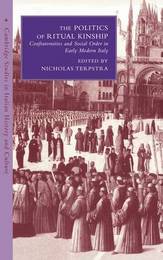
|
The Politics of Ritual Kinship: Confraternities and Social Order in Early Modern Italy
Hardback
Main Details
Description
Confraternities were the most common form of organised religious life in medieval and early modern Europe. They were at once the lay face of the church, the spiritual heart of civic government, and the social kin who claimed the allegiance of peers and the obedience of subordinates. In this collection, fifteen scholars examine the development of confraternities in Italy, where they emerged first and had the greatest impact. Individual essays explore a common set of themes across Italy from the twelfth to the eighteenth centuries: the ubiquity of confraternities, social construction, and devotional ethos; their ritual culture and civic religion; their antagonistic and collaborative relations with both civic and ecclesiastical authorities; and their role in social welfare and social control of marginal groups. The authors demonstrate how the ritual kinship expressed in confraternities emerged in the middle ages and became a powerful force in 'civilising' early modern Italian society.
Reviews'... breathtaking in the range of subjects and timescale considered ... a welcome addition to the growing body of scholarship on Italian confraternities'. William B. Wurthmann, Journal of Ecclesiastical History '... the contributors enrich our understanding of the complex nature of lay charitable and pious activities and identities on the brink of the modern age.' Jennifer D. Selwyn, Archivum Historicum
|